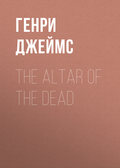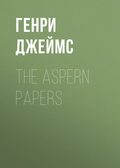
Генри Джеймс
The Sacred Fount
So much for the course of my impressions while the music lasted—a course quite consistent with my being prepared for new combinations as soon as it was over. Promptly, when that happened, the bow was unbent; and the combination I first seized, amid motion and murmur and rustle, was that, once more, of poor Briss and Lady John, the latter of whom had already profited by the general reaction to endeavour to cultivate afresh the vainest of her sundry appearances. She had laid on him the same coercive hand to which I owed my having found him with her in the afternoon, but my intervention was now to operate with less ceremony. I chanced to be near enough to them for Brissenden, on seeing me, to fix his eyes on me in silence, but in a manner that could only bring me immediately nearer. Lady John never did anything in silence, but she greeted me as I came up to them with a fine false alarm. "No, indeed," she cried, "you shan't carry him off this time!"—and poor Briss disappeared, leaving us face to face, even while she breathed defiance. He had made no joke of it, and I had from him no other recognition; it was therefore a mere touch, yet it gave me a sensible hint that he had begun, as things were going, to depend upon me, that I already in a fashion figured to him—and on amazingly little evidence after all—as his natural protector, his providence, his effective omniscience. Like Mrs. Server herself, he was materially on my hands, and it was proper I should "do" for him. I wondered if he were really beginning to look to me to avert his inexorable fate. Well, if his inexorable fate was to be an unnameable climax, it had also its special phases, and one of these I had just averted. I followed him a moment with my eyes, and I then observed to Lady John that she decidedly took me for too simple a person. She had meanwhile also watched the direction taken by her liberated victim, and was the next instant prepared with a reply to my charge. "Because he has gone to talk with May Server? I don't quite see what you mean, for I believe him really to be in terror of her. Most of the men here are, you know, and I've really assured myself that he doesn't find her any less awful than the rest. He finds her the more so by just the very marked extra attention that you may have noticed she has given him."
"And does that now happen to be what he has so eagerly gone off to impress upon her?"
Lady John was so placed that she could continue to look at our friends, and I made out in her that she was not, in respect to them, without some slight elements of perplexity. These were even sufficient to make her temporarily neglect the defence of the breach I had made in her consistency. "If you mean by 'impressing upon' her speaking to her, he hasn't gone—you can see for yourself—to impress upon her anything; they have the most extraordinary way, which I've already observed, of sitting together without sound. I don't know," she laughed, "what's the matter with such people!"
"It proves in general," I admitted, "either some coldness or some warmth, and I quite understand that that's not the way you sit with your friends. You steer admirably clear of every extravagance. I don't see, at any rate, why Mrs. Server is a terror–"
But she had already taken me up. "If she doesn't chatter as I do?" She thought it over. "But she does—to everyone but Mr. Briss. I mean to every man she can pick up."
I emulated her reflection. "Do they complain of it to you?"
"They're more civil than you," she returned; "for if, when they flee before it, they bump up against me in their flight, they don't explain that by intimating that they're come from bad to worse. Besides, I see what they suffer."
"And do you hear it?"
"What they suffer? No, I've taken care not to suffer myself. I don't listen. It's none of my business."
"Is that a way of gently expressing," I ventured to ask, "that it's also none of mine?"
"It might be," she replied, "if I had, as you appear to, the imagination of atrocity. But I don't pretend to so much as conceive what's your business."
"I wonder if it isn't just now," I said after a moment, "to convict you of an attempt at duplicity that has not even had the saving grace of success! Was it for Brissenden himself that you spoke just now as if you believed him to wish to cling to you?"
"Well, I'm kind enough for anything," she goodnaturedly enough laughed. "But what," she asked more sharply, "are you trying to find out?"
Such an awful lot, the answer to this would politely have been, that I daresay the aptness of the question produced in my face a shade of embarrassment. I felt, however, the next moment that I needn't fear too much. What I, on approaching Lady John, had found myself moved to test, using her in it as a happy touchstone, was the degree of the surrounding, the latent, sense of things: an impulse confirmed by the manner in which she had momentarily circled about the phenomenon of Mrs. Server's avidity, about the mystery of the terms made with it by our friend. It was present to me that if I could catch, on the part of my interlocutress, anything of a straight scent, I might take that as the measure of a diffused danger. I mentally applied this term to the possibility of diffusion, because I suddenly found myself thinking with a kind of horror of any accident by which I might have to expose to the world, to defend against the world, to share with the world, that now so complex tangle of hypotheses that I have had for convenience to speak of as my theory. I could toss the ball myself, I could catch it and send it back, and familiarity had now made this exercise—in my own inner precincts—easy and safe. But the mere brush of Lady John's clumsier curiosity made me tremble for the impunity of my creation. If there had been, so to speak, a discernment, however feeble, of my discernment, it would have been irresistible to me to take this as the menace of some incalculable catastrophe or some public ugliness. It wasn't for me definitely to image the logical result of a verification by the sense of others of the matter of my vision; but the thing had only to hang before me as a chance for me to feel that I should utterly object to it, though I may appear to weaken this statement if I add that the opportunity to fix the degree of my actual companion's betrayed mystification was almost a spell. This, I conceive, was just by reason of what was at stake. How could I happily tell her what I was trying to find out?—tell her, that is, not too much for security and yet enough for relief? The best answer seemed a brave jump. I was conscious of a certain credit open with her in my appearance of intellectual sympathy.
"Well," I brought out at last, "I'm quite aching to ask you if you'll forgive me a great liberty, which I owe to your candid challenge my opportunity to name. Will you allow me to say frankly that I think you play a dangerous game with poor Briss, in whom I confess I'm interested? I don't of course speak of the least danger to yourself; but it's an injustice to any man to make use of him quite so flagrantly. You don't in the least flatter yourself that the poor fellow is in love with you—you wouldn't care a bit if he were. Yet you're willing to make him think you like him, so far as that may be necessary to explain your so frequently ingenious appropriation of him. He doesn't like you too much, as yet; doesn't even like you quite enough. But your potency may, after all, work on him, and then, as your interest is so obviously quite elsewhere, what will happen will be that you'll find, to your inconvenience, that you've gone too far. A man never likes a woman enough unless he likes her more than enough. Unfortunately it's what the inveterate ass is sure sooner or later to do."
Lady John looked just enough interested to look detached from most of the more vulgar liabilities to offence. "Do I understand that to be the pretty name by which you describe Mr. Briss?"
"He has his share of it, for I'm thinking of the idiots that we everyone of us are. I throw out a warning against a contingency."
"Are you providing for the contingency of his ceasing to care for his wife? If you are"—and Lady John's amusement took on a breadth—"you may be said to have a prudent mind and to be taking time by the forelock."
At this I pricked up my ears. "Do you mean because of his apparently incorruptible constancy?"
"I mean because the whole thing's so before one. She has him so in hand that they're neither of them in as much danger as would count for a mouse. It doesn't prevent his liking to dally by the way—for she dallies by the way, and he does everything she does. Haven't I observed her," Lady John continued, "dallying a little, so far as that goes, with you? You've the tact to tell me that he doesn't think me good enough, but I don't require, do I?—for such a purpose as his—to be very extraordinarily good. You may say that you wrap it up immensely and try to sugar the dose! Well, all the same, give up, for a quiet life, the attempt to be a providence. You can't be a providence and not be a bore. A real providence knows; whereas you," said Lady John, making her point neatly, "have to find out—and to find out even by asking 'the likes of' me. Your fine speech meanwhile doesn't a bit tell me what."
It affected me again that she could get so near without getting nearer. True enough it was that I wanted to find out; and though I might expect, or fear, too much of her, I wondered at her only seeing this—at her not reading deeper. The peril of the public ugliness that haunted me rose or fell, at this moment, with my varying view of her density. Or rather, to be more exact, I already saw her as necessarily stupid because I saw her as extravagantly vain. What I see now of course is that I was on my own side almost stupidly hard with her—as I may also at that hour have been subject to her other vice. Didn't I perhaps, in proportion as I felt how little she saw, think awfully well of myself, as we said at Newmarch, for seeing so much more? It comes back to me that the sense thus established of my superior vision may perfectly have gone a little to my head. If it was a frenzied fallacy I was all to blame, but if it was anything else whatever it was naturally intoxicating. I really remember in fact that nothing so much as this confirmed presumption of my impunity had appeared to me to mark the fine quality of my state. I think there must fairly have been a pitch at which I was not sure that not to partake of that state was, on the part of others, the sign of a gregarious vulgarity; as if there were a positive advantage, an undiluted bliss, in the intensity of consciousness that I had reached. I alone was magnificently and absurdly aware—everyone else was benightedly out of it. So I reflected that there would be almost nothing I mightn't with safety mention to my present subject of practice as an acknowledgment that I was meddlesome. I could put no clue in her hand that her notorious acuteness would make of the smallest use to her. The most she could do would be to make it of use to myself, and the clue it seemed best to select was therefore a complete confession of guilt.
"You've a lucidity of your own in which I'm forced to recognise that the highest purity of motive looks shrivelled and black. You bring out accordingly what has made me thus beat about the bush. Have you really such a fund of indulgence for Gilbert Long as we most of us, I gather—though perhaps in our blindness—seem to see it stick out again that he supposes? May he fondly feel that he can continue to count on it? Or, if you object to my question in that form, is it not, frankly, to making his attitude—after all so thoroughly public—more convenient to each of you that (without perhaps quite measuring what you're about,) you've gone on sacrificing poor Briss? I call it sacrificing, you see, in spite of there having been as yet no such great harm done. And if you ask me again what business of mine such inquiries may represent, why, the best thing will doubtless be to say to you that, with a smaller dose of irrepressible irony in my composition than you have in yours, I can't make so light as you of my tendency to worry on behalf of those I care for. Let me finally hasten to add that I'm not now including in that category either of the two gentlemen I've named."
I freely concede, as I continue my record, that to follow me at all, at this point, gave proof on Lady John's part of a faculty that should have prevented my thinking of her as inordinately backward. "Then who in the world are these objects of your solicitude?"
I showed, over and above my hesitation, my regret for the need of it. "I'm afraid I can't tell you."
At this, not unnaturally, she fairly scoffed. "Asking me everything and telling me nothing, you nevertheless look to me to satisfy you? Do you mean," she pursued, "that you speak for persons whose interest is more legitimately founded than the interest you so flatteringly attribute to myself?"
"Well, yes—let them be so described! Can't you guess," I further risked, "who constitutes at least one of my preoccupations?"
The condescension of her consent to think marked itself handsomely enough. "Is it your idea to pretend to me that I'm keeping Grace Brissenden awake?" There was consistency enough in her wonder. "She has not been anything but nice to me; she's not a person whose path one crosses without finding it out; and I can't imagine what has got into her if any such grievance as that is what she has been pouring out to you in your apparently so deep confabulations."
This toss of the ball was one that, I saw quickly enough, even a taste for sport wouldn't justify my answering, and my logical interest lay moreover elsewhere. "Dear no! Mrs. Brissenden certainly feels her strength, and I should never presume to take under my charge any personal situation of hers. I had in my mind a very different identity."
Lady John, as if to be patient with me, looked about at our companions for a hint of it, wondering which of the ladies I might have been supposed to "care for" so much as to tolerate in her a preference for a rival; but the effect of this survey was, I the next instant observed, a drop of her attention from what I had been saying. Her eye had been caught by the sight of Gilbert Long within range of us, and then had been just visibly held by the fact that the person seated with him on one of the small sofas that almost of necessity made conversation intimate was the person whose name, just uttered between us, was, in default of the name she was in search of, still in the air. Gilbert Long and Mrs. Briss were in familiar colloquy—though I was aware, at the first flush, of nothing in this that should have made my interlocutress stare. That is I was aware of nothing but that I had simultaneously myself been moved to some increase of sharpness. What could I have known that should have caused me to wonder at the momentary existence of this particular conjunction of minds unless it were simply the fact that I hadn't seen it occur amid the many conjunctions I had already noticed—plus the fact that I had a few minutes before, in the interest of the full roundness of my theory, actually been missing it? These two persons had met in my presence at Paddington and had travelled together under my eyes; I had talked of Mrs. Briss with Long and of Long with Mrs. Briss; but the vivid picture that their social union forthwith presented stirred within me, though so strangely late in the day, it might have seemed, for such an emotion, more than enough freshness of impression. Yet—now that I did have it there—why should it be vivid, why stirring, why a picture at all? Was any temporary collocation, in a house so encouraging to sociability, out of the range of nature? Intensely prompt, I need scarcely say, were both my freshness and my perceived objections to it. The happiest objection, could I have taken time to phrase it, would doubtless have been that the particular effect of this juxtaposition—to my eyes at least—was a thing not to have been foreseen. The parties to it looked, certainly, as I felt that I hadn't prefigured them; though even this, for my reason, was not a description of their aspect. Much less was it a description for the intelligence of Lady John—to whom, however, after all, some formulation of what she dimly saw would not be so indispensable.
We briefly watched, at any rate, together, and as our eyes met again we moreover confessed that we had watched. And we could ostensibly have offered each other no explanation of that impulse save that we had been talking of those concerned as separate and that it was in consequence a little odd to find ourselves suddenly seeing them as one. For that was it—they were as one; as one, at all events, for my large reading. My large reading had meanwhile, for the convenience of the rest of my little talk with Lady John, to make itself as small as possible. I had an odd sense, till we fell apart again, as of keeping my finger rather stiffly fixed on a passage in a favourite author on which I had not previously lighted. I held the book out of sight and behind me; I spoke of things that were not at all in it—or not at all on that particular page; but my volume, none the less, was only waiting. What might be written there hummed already in my ears as a result of my mere glimpse. Had they also wonderfully begun to know? Had she, most wonderfully, and had they, in that case, prodigiously come together on it? This was a possibility into which my imagination could dip even deeper than into the depths over which it had conceived the other pair as hovering. These opposed couples balanced like bronze groups at the two ends of a chimney-piece, and the most I could say to myself in lucid deprecation of my thought was that I mustn't take them equally for granted merely because they balanced. Things in the real had a way of not balancing; it was all an affair, this fine symmetry, of artificial proportion. Yet even while I kept my eyes away from Mrs. Briss and Long it was vivid to me that, "composing" there beautifully, they could scarce help playing a part in my exhibition. The mind of man, furthermore—and my generalisation pressed hard, with a quick twist, on the supersubtlety as to which I had just been privately complacent—the mind of man doubtless didn't know from one minute to the other, under the appeal of phantasmagoric life, what it would profitably be at. It had struck me a few seconds before as vulgarly gross in Lady John that she was curious, or conscious, of so small a part; in spite of which I was already secretly wincing at the hint that these others had begun to find themselves less in the dark and perhaps even directly to exchange their glimmerings.
My personal privilege, on the basis of the full consciousness, had become, on the spot, in the turn of an eye, more than questionable, and I was really quite scared at the chance of having to face—of having to see them face—another recognition. What did this alarm imply but the complete reversal of my estimate of the value of perception? Mrs. Brissenden and Long had been hitherto magnificently without it, and I was responsible perhaps for having, in a mood practically much stupider than the stupidest of theirs, put them gratuitously and helplessly on it. To be without it was the most consistent, the most successful, because the most amiable, form of selfishness; and why should people admirably equipped for remaining so, people bright and insolent in their prior state, people in whom this state was to have been respected as a surface without a scratch is respected, be made to begin to vibrate, to crack and split, from within? Wasn't it enough for me to pay, vicariously, the tax on being absurd? Were we all to be landed, without an issue or a remedy, in a condition on which that tax would be generally levied? It was as if, abruptly, with a new emotion, I had wished to unthink every thought with which I had been occupied for twenty-four hours. Let me add, however, that even had this process been manageable I was aware of not proposing to begin it till I should have done with Lady John.
The time she took to meet my last remark is naturally not represented by this prolonged glance of mine at the amount of suggestion that just then happened to reach me from the other quarter. It at all events duly came out between us that Mrs. Server was the person I did have on my mind; and I remember that it had seemed to me at the end of a minute to matter comparatively little by which of us, after all, she was first designated. There is perhaps an oddity—which I must set down to my emotion of the moment—in my not now being able to say. I should have been hugely startled if the sight of Gilbert Long had appeared to make my companion suddenly think of her; and reminiscence of that shock is not one of those I have found myself storing up. What does abide with me is the memory of how, after a little, my apprehensions, of various kinds, dropped—most of all under the deepening conviction that Lady John was not a whit less agreeably superficial than I could even at the worst have desired. The point established for me was that, whereas she passed with herself and so many others as taking in everything, she had taken in nothing whatever that it was to my purpose she should not take. Vast, truly, was the world of observation, that we could both glean in it so actively without crossing each other's steps. There we stood close together, yet—save for the accident of a final dash, as I shall note—were at opposite ends of the field.
It's a matter as to which the truth sounds priggish, but I can't help it if—yes, positively—it affected me as hopelessly vulgar to have made any induction at all about our companions but those I have recorded, in such detail, on behalf of my own energy. It was better verily not to have touched them—which was the case of everyone else—than to have taken them up, with knowing gestures, only to do so little with them. That I felt the interest of May Server, that May Server felt the interest of poor Briss, and that my feeling incongruously presented itself as putting up, philosophically, with the inconvenience of the lady's—these were, in fine, circumstances to which she clearly attached ideas too commonplace for me to judge it useful to gather them in. She read all things, Lady John, heaven knows, in the light of the universal possibility of a "relation"; but most of the relations that she had up her sleeve could thrust themselves into my theory only to find themselves, the next minute, eliminated. They were of alien substance—insoluble in the whole. Gilbert Long had for her no connection, in my deeper sense, with Mrs. Server, nor Mrs. Server with Gilbert Long, nor the husband with the wife, nor the wife with the husband, nor I with either member of either pair, nor anyone with anything, nor anything with anyone. She was thus exactly where I wanted her to be, for, frankly, I became conscious, at this climax of my conclusion, that I a little wanted her to be where she had distinctly ended by betraying to me that her proper inspiration had placed her. If I have just said that my apprehensions, of various kinds, had finally and completely subsided, a more exact statement would perhaps have been that from the moment our eyes met over the show of our couple on the sofa, the question of any other calculable thing than that hint of a relation had simply known itself superseded. Reduced to its plainest terms, this sketch of an improved acquaintance between our comrades was designed to make Lady John think. It was designed to make me do no less, but we thought, inevitably, on different lines.
I have already so represented my successions of reflection as rapid that I may not appear to exceed in mentioning the amusement and philosophy with which I presently perceived it as unmistakable that she believed in the depth of her new sounding. It visibly went down for her much nearer to the bottom of the sea than any plumb I might be qualified to drop. Poor Briss was in love with his wife—that, when driven to the wall, she had had to recognise; but she had not had to recognise that his wife was in love with poor Briss. What was then to militate, on that lady's part, against a due consciousness, at the end of a splendid summer day, a day on which occasions had been so multiplied, of an impression of a special order? What was to prove that there was "nothing in it" when two persons sat looking so very exceptionally much as if there were everything in it, as if they were for the first time—thanks to finer opportunity—doing each other full justice? Mustn't it indeed at this juncture have come a little over my friend that Grace had lent herself with uncommon good nature, the previous afternoon, to the arrangement by which, on the way from town, her ladyship's reputation was to profit by no worse company, precisely, than poor Briss's? Mrs. Brissenden's own was obviously now free to profit by my companion's remembering—if the fact had reached her ears—that Mrs. Brissenden had meanwhile had Long for an escort. So much, at least, I saw Lady John as seeing, and my vision may be taken as representing the dash I have confessed myself as making from my end of our field. It offers us, to be exact, as jostling each other just sensibly—though I only might feel the bruise—in our business of picking up straws. Our view of the improved acquaintance was only a straw, but as I stooped to it I felt my head bump with my neighbour's. This might have made me ashamed of my eagerness, but, oddly enough, that effect was not to come. I felt in fact that, since we had even pulled against each other at the straw, I carried off, in turning away, the larger piece.







